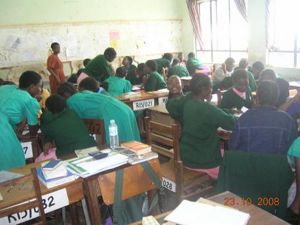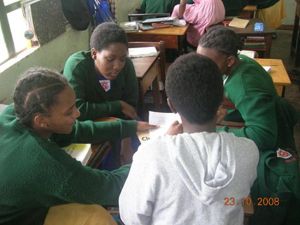Talk:Ted/Pedagogy/Big Classes
Class Sizes
- May I ask you: Is it really true that you have 67! students in your class? And is that typical? I mean we have to have this in mind in order to adjust our pedagogic to these masses! I hope you don't get too envious if I tell you that our grade 11 classes here in my school only have about 26 students :-)--White Eagle 07:59, 17 October 2008 (UTC)
- I have 3 classes and that of 67 is the smallest!! the second is 71 and the third is 74. The government recently started a programme, "universal secondary education", a form of free education for all at this level,and I must say it has put a lot of strain on the resources, initially, for example, each of these classes was planned for 30!! That is a real challenge, isn't it? even the idea of hands-on becomes a little wild! --WikiFlora 09:40, 18 October 2008 (UTC)
- Uffff, Florence, my ideas of teaching in Ugandan schools are changing ... Yeah, real challenge, for you and for u s ! I think we have to discuss this topic! See good idea nr. 15!--White Eagle 08:30, 21 October 2008 (UTC)
- I have 3 classes and that of 67 is the smallest!! the second is 71 and the third is 74. The government recently started a programme, "universal secondary education", a form of free education for all at this level,and I must say it has put a lot of strain on the resources, initially, for example, each of these classes was planned for 30!! That is a real challenge, isn't it? even the idea of hands-on becomes a little wild! --WikiFlora 09:40, 18 October 2008 (UTC)
Pedagogics for big classes: student centered tuition
Florence stated, see good idea nr. 9., that her 3 classes have 67 to 74 students. I know a bit what she's talking about as I was once teaching in the Philippines where I had 56 in one of the classes, and this I found a lot, as we in Bavaria/Germany have a maximum of around 34. Teachers here say, that 34 is too much, and that one can not properly educate the children with these masses. What then will you say in Uganda? Now, don't let us complain, thats of no use. But find out, what didactics (pedagogics) we can use to educate well.
My input: Let us get away from the old fashioned concept that only the teacher is the one who knows and the students are ignorant. (I tell you my little daughter with her 2 years, she is s o intelligent! She knows how to reach her aims!) Let us create an atmosphere of student participation in our classrooms, where the students take over responsibility and work for their own education and the one of their classmates. There are numerous methods to get students to become teachers, one famous is Learning by teaching.
In my own experience, the simplest way is group work. Precondition: written materials. One set for each group. After a short introduction to the subject at the blackboard, groups of about 4 students are being formed. Together they solve the given problems. The teacher walks around and facilitates. At the end a presentation of the solutions by the students themselves, the teacher acts as the one who gives reliability. But really, I know of some more methods. Another one is called "learning stations". A carousel of stations in the classroom where certain works have to be accomplished. If you once have produced the materials, they can be used over and over again. (And where to produce them? WE! :-) ). Or simply "free activities": The problems are written on file cards, the solution on the back. Students go and fetch a card, work it through and give it back. Good training method. The file cards are produced collectively by the teachers. And the best: Such cards already exist in the internet, they only have to be chosen and printed....--White Eagle 09:09, 21 October 2008 (UTC)
- Thanks for these introductions to these pedagogies,they really look insightful.However I am not quite sure I understand the difference between group work(that seems more attractive to me) and the learning stations. I am really convinced we are going to achieve a lot in this project. How I would want all physics teachers to be involved! Do you know of any Internet link to these cards please?
--WikiFlora 12:17, 21 October 2008 (UTC)
- Hi Florence, just call me Günther. Learning stations are stations in the classroom where certain problems have to be solved, either calculations or practical hands-on experiments. The class is divided in groups that walk around in a carousel. Each group reaches each station once. With group work its simpler because every group stays at its place. I can tell you from my experience, this is a v e r y powerful method. There were times when I did 50% of my teaching in maths by group work. In Physics I don't use it so much, but alway the last 2 lessons before an exam. Its ideal for repetition and training. If you are interested, I'll write an article on it here in WE - as soon as I find the time. In respect to the cards: I only know of such materials in German. But I am sure, this i s a hot topic. I've put it on our list!--White Eagle 08:53, 22 October 2008 (UTC)
- On Oct. 22 Vincent wrote in an email for me: "I am reading through the learning by teaching article and I am eager to use it shortly in class. Really innovative! How we rarely think about students as resources! I think this is a great mistake."--White Eagle 12:22, 22 October 2008 (UTC)
Today I used group work and the results were really amusing. More increased involvement

 --Vkizza 15:05, 23 October 2008 (UTC)
--Vkizza 15:05, 23 October 2008 (UTC)
- Hi Vincent, thanks for these most encouraging pictures! But did you think of privacy policy showing your students on the internet? Here in Bavaria we need a written agreement from each of our students if we want to upload their portraits. Group work: I think you did it the right way: Just try it and enjoy it. The students enjoy it anyway. I know of a maths teacher here in Munich that teaches all of her tuition in group work (a very extreme position, but possible. As soon as I find the time, I'll write an article about group work.--Günther Osswald 07:50, 24 October 2008 (UTC)
- [View source↑]
- [History↑]